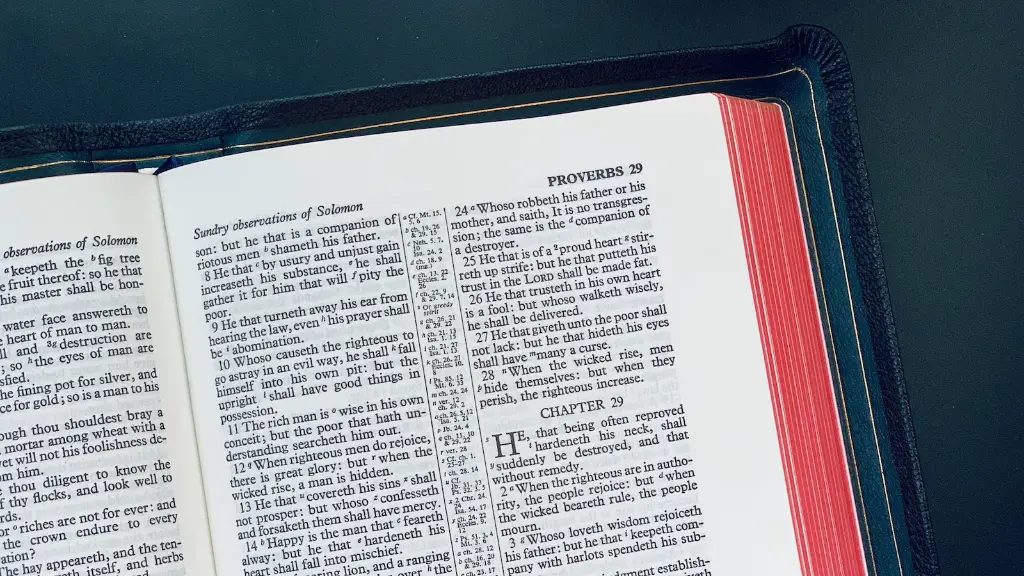The Bible has long been revered by those who ascribe to its teachings, and Christianity itself is built upon the foundation of its words and the interpretations of them. But, what is the true church according to the Bible? That answer is not as straightforward as some would like it to be and is open to wider interpretation. From Jesus’ words to the various denominations of Christianity, the Bible is wide open to interpretation and discussion.
For many, the true church is the Catholic Church. Much of the Christian faith is rooted in the ideals and directives set forth within the Catholic Church, and it is the oldest Christian denomination in the world. The Catholic Church is founded upon the basic tenets of Christianity, such as loving one another and following the teachings of Jesus Christ. Catholicism often encourages its worshippers to live lives of charity and to focus on service to others.
Other denominations, such as Protestantism and Baptism, are grounded in a different set of beliefs that focus more on personal faith than established doctrine. These churches believe in the power of faith alone and focus more on individual scripture interpretation and doctrinal practices rather than papal authority. Examples of these churches include the Mennonites, the Quakers, and the Salvation Army.
Other denominations, however, such as Pentecostalism and Charismatism, focus on spiritual gifts and the ministry of the Holy Spirit. These denominations have a much stronger emphasis on gifts and signs than many of the more “mainstream” churches. Examples of these churches include the Pentecostal Church of God and the Church of God in Christ.
Still, other denominations focus on personal faith in addition to doctrinal beliefs and practices. These churches seek to be faithful to Jesus’ teachings, while also allowing individuals to interpret scripture in their own way and make their own decisions about their upbringing and daily lives. Examples of these churches include the Church of the Open Door, the Evangelical Covenant Church, and the Vineyard Church.
Ultimately, the true church according to the Bible is up to individual interpretation. The Bible is more a collection of stories, laws, and teachings than one unified set of beliefs, and each person has their own relationship and understanding of it.
The Relationship Between Church and State
The relationship between church and state has shifted and changed over time, depending on the beliefs held by the individuals or groups in power. In general, however, the church and state have usually been kept separate. This separation is particularly important in countries like the United States, which means that churches are generally free to set their own expectations and standards.
This separation has allowed the various different denominations to practice their faiths without interference from the government. This means that a denomination can choose to practice whatever form of worship it wishes without fear of government reprisal, as long as it does not infringe on the freedoms of others.
This separation also gives the church more freedom in how it administers its policies and beliefs. This allows the church to make decisions about its own doctrine and religious practices, free from government interference. This separation has allowed denominations to remain relatively independent and autonomous.
At the same time, while the separation of church and state is important, it is also important to recognize that religious beliefs and practices have long had an impact on government policies. Political leaders and public officials have often taken guidance from religious leaders, prompting changes in the laws of the land. This is particularly true when it comes to matters of morality, such as abortion or same-sex marriage.
The overall role of the church within a state is something that is a matter of personal perspective, as there is no one-size-fits-all answer. However, it is important to remember that the separation of church and state has its purpose and should be respected.
Different Points of View
When it comes to determining the true church according to the Bible, there are many different points of view. The different denominations of Christianity have varying interpretations of scripture, differing opinions of the clergy, and different attitudes towards the role of the church in society.
These differing points of view can lead to conflict between different denominations, as they all have their own ideas of what constitutes a “true” Christian. This level of disagreement within the Church can lead to misunderstandings, hurt feelings, and even physical violence in some cases.
The Catholic Church, for example, is often seen by Protestants as the most authoritative Christian body and is often viewed as having a strict, unwavering set of beliefs. On the other hand, Protestants often see the Catholic Church as rigid and out of touch with the modern evangelical Christian.
Within the Protestant faith, there is also much disagreement and debate about the true nature of Christianity. This can create animosity between Presbyterians, Baptists, and other denominations, as each side feels as though their interpretation of scripture is the most “correct” one.
Different denominations can also disagree about moral issues, such as abortion and same-sex marriage. This can lead to divides among denominations and make it difficult to find common ground, as each denomination holds to their own beliefs about these issues.
Finding Common Ground
Despite the differences between denominations, there are still some common ground to be found. All Christians share a love for Jesus and the desire to follow his teachings. This means that, regardless of denomination, all Christians can find something to unite over.
Rather than focusing on the differences between denominations, it is important to remember that all Christians are united by their faith. This means that there is much more that unites us than divides us. That being said, there are still some areas where denominations will always find themselves in disagreement.
It is important to remember that finding common ground does not mean compromising one’s beliefs or intentions. Instead, it is about recognizing that, although there may be some areas of disagreement, there is still much that we can all agree on. This includes the principles of loving one another, being generous to those in need, and following the teachings of Jesus.
Loving Your Neighbour
Jesus taught that “love your neighbour as yourself” is the greatest commandment, and that is a message that many Christians still try to live by today. This means that, regardless of their denomination, all Christians should be devoted to loving and serving their neighbours.
This idea of loving one’s neighbour applies to both those within our own denomination and those outside of it. It is important to remember that we are all brothers and sisters in Christ, and that we should all strive to treat each other with love and respect. This means being generous, kind, and willing to listen to each other.
Many churches have outreach programs and ministries that are devoted to helping those in need, regardless of their religious background. This is an important way to show love and compassion to all of our neighbours, and is something that is strongly emphasized in the Bible.
In the end, it is important to remember that, regardless of denomination, we are all united by our faith in Jesus Christ. This means that, regardless of our differences, we can still strive to be loving and generous to one another and serve one another with compassion. This is the message that the Bible emphasizes, and it is the same message that all Christians share.
Interpreting the Bible
Ultimately, understanding the true church according to the Bible is a question that is open to interpretation. As mentioned above, there are many different denominations and sects of Christianity, and each one can interpret scripture in their own way.
However, it is important to remember that, while there can be many different interpretations, the ultimate authority of the Bible remains the same. When it comes to deciphering what is true, it is important to remember that the Bible should be the ultimate authority.
Many Christians also rely on the guidance and teachings of certain individuals in interpreting the Bible, such as pastors and other religious leaders. However, it is important to remember that it isn’t the individual interpretations that matter, but rather the overall message of the Bible.
At the same time, some denominations rely on the teachings of tradition, such as the Catholic Church. While the teachings of tradition can be helpful in understanding the Bible, it is still important to remember that the ultimate source of truth is the Bible itself.
Ultimately, the true church according to the Bible is a matter of individual interpretation. The Bible contains many different stories, laws, and teachings, and it is up to each individual to determine how they interpret and apply these to their own lives.





